Life Sciences News
See our Latest Journal Publications
ENABLE workshop: Are the university learning environments as inclusive as we think?
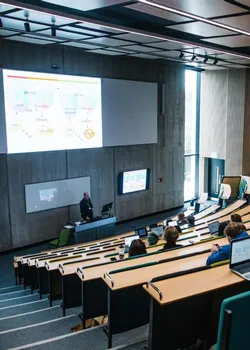 On Friday 29 September 2023, the School of Life Sciences will be hosting a free workshop: "Are the university learning environments as inclusive as we think? An investigation from the awarding perspective".
On Friday 29 September 2023, the School of Life Sciences will be hosting a free workshop: "Are the university learning environments as inclusive as we think? An investigation from the awarding perspective".
Based on a thorough data analysis from recent years and first-hand practical experience, the workshop will identify existing reasons for lack of inclusivity and unbiased awarding in biological science and related degree streams.
The workshop participants, comprising academic leaders, teaching professionals and a diverse student community, will also provide on consensus recommendations on how to close existing awarding gaps for a more inclusive learning and teaching environment throughout the UK.
Consensus recommendations will be published in a peer-reviewed journal.
University of Warwick Innovation Campus Growth Plan Takes a Step Forward
Plans to grow the University of Warwick Innovation Campus Stratford-upon-Avon at Wellesbourne have taken an important step forward. Stratford-on-Avon District Council has approved a plan to guide the long-term growth of the Campus.
Press release (4 July 2023)
Helping plants and bacteria work together reduces fertiliser need
Today, published in Microbiome, Dr Beatriz Lagunas and colleagues at the Universities of Warwick and Justus Liebig (Germany) have shown a new way to boost plant nutrient uptake and growth. This could reduce the need for fertilisers, an input to agriculture which can be harmful for the environment. Fertilisers can run into waterways, or get broken down by microbes in the soil, releasing the potent greenhouse gas nitrous oxide into the atmosphere.
Press release (3 July 2023)
The first British Baked Beans could be on the breakfast menu thanks to University of Warwick research
Professor Eric Holub, a plant scientist at Warwick Crop Centre, has developed Haricot bean varieties which can be sown in early May and harvested as a dry grain before mid-September, matching the UK's warmer months. Until now, it has been impossible for farmers to grow the haricot variety used for baked beans in the UK because they are incompatible with the climate.
Press Release (16 June 2023)
The story was also on BBC Breakfast. Watch it on iPlayer (from 22m 30s)
Faculty Post Doc Prizes awarded to Amol Bhandare and Richard Guillionneau
Each year, the Faculty of Science, Engineering and Medicine (SEM) funds a prize for the best Warwick-affiliated research output from an Early Career Researcher (ECR). Each department nominates a winner out of the applications received after a judging process as determined by the Faculty. This year the School of Life Sciences has awarded two prizes:
- Dr Amol Bhandare
- Dr Richard Guillioneau
The Panel recognised the scientific excellence of the research published in these outputs and the leading roles that both researchers had taken in conceiving and undertaking the research.
New discovery stops bacterial virus contamination
A new discovery by Dr Antonia Sagona and colleagues could help stop bacteria being contaminated with viruses, reducing disruption and decreasing costs in industry and research.
Press Release (18 April 2023)
One of the Best Universities for Work Experience
 We are thrilled to announce that the University of Warwick has been ranked 12th Best University for Work Experience by RateMyPlacement, in their inaugural Best University for Work Experience table.
We are thrilled to announce that the University of Warwick has been ranked 12th Best University for Work Experience by RateMyPlacement, in their inaugural Best University for Work Experience table.
The School of Life Sciences is proud of the work we do to support our students in accessing and engaging with quality work experience opportunities, from internships to yearlong placements.
Mineli, BSc Biomedical Science with Placement Year, currently on placement at Pfizer says:
“The University has been really helpful in providing a variety of resources that help students find work experience opportunities. Particularly within the School of Life Sciences, there are weekly 'Careers round-ups' which all students receive. These detail the latest updates and opportunities that companies are advertising - whether that be internship, placement of research opportunities.
The Careers and Placements team are dedicated to ensuring students can maximise their chances of securing a placement as well. They ensure students have access to mock interviews as well as providing useful feedback on applications.
The combination of all these services and resources has allowed Warwick students, myself included, to have the best possible chances of securing our ideal work experience, gaining a competitive advantage when entering the job market.“
Honorary Fellow
 Professor Murray Grant has been re-elected as an Honorary Fellow of the Academy of the Royal Society of New Zealand. Fellows have made contributions to knowledge at the highest levels in their different fields and across disciplinary boundaries. Find out more
Professor Murray Grant has been re-elected as an Honorary Fellow of the Academy of the Royal Society of New Zealand. Fellows have made contributions to knowledge at the highest levels in their different fields and across disciplinary boundaries. Find out more
Can super-speedy plant cells feed a growing population?
 Dr Joe Mckenna has been awarded a BBSRC Discovery Fellowship of £535,000 to investigate actin – a natural molecule contained in plant cells – to see whether it can be engineered to move faster and so grow bigger plants with more biomass.
Dr Joe Mckenna has been awarded a BBSRC Discovery Fellowship of £535,000 to investigate actin – a natural molecule contained in plant cells – to see whether it can be engineered to move faster and so grow bigger plants with more biomass.
Press release (21 March 2023)
Increase homegrown fruit and veg and add £0.5bn to the economy say scientists – as we reel from supermarket shortages
As the UK reels from recent fruit and vegetable shortages, scientists are advising how to increase homegrown produce – benefitting the economy and the environment.
Press release (9 March 2023)
Two domestications for grapes
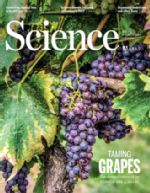 Professor Robin Allaby gives his perspective in Science, on the evolutionary events that led to grape domestication. The article made the front cover.
Professor Robin Allaby gives his perspective in Science, on the evolutionary events that led to grape domestication. The article made the front cover.
Read the paper (3 March 2023)
Growing British - Professor Napier on Radio 4
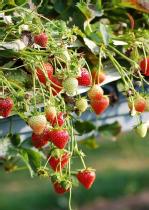 On Thursday 2 March, Professor Richard Napier was featured on the BBC Radio 4 Farming Today programme talking about a new green paper “Growing British” he helped to create. It’s a strategy highlighting how to increase fruit and veg production in the UK. Listen (from 1:14).
On Thursday 2 March, Professor Richard Napier was featured on the BBC Radio 4 Farming Today programme talking about a new green paper “Growing British” he helped to create. It’s a strategy highlighting how to increase fruit and veg production in the UK. Listen (from 1:14).
A “zinc” in the armour: could metal help combat common superbug?
A new study has shown that zinc plays a key role in a hospital superbug, that doctors struggle to treat due to its resistance to antibiotics.
Press Release (15 February 2023)
Bacteria communicate like us – and we could use this to help address antibiotic resistance
Like the neurons firing in human brains, bacteria use electricity to communicate and respond to environmental cues. Now, researchers have discovered a way to control this electrical signalling in bacteria, to better understand resistance to antibiotics.
In the study published in Advanced Science, Dr Munehiro and colleagues, report a major step forward in regulating bacterial electric signals with light.
Press Release (13 February 2023)
Earthquakes in Turkey & Syria
Our thoughts are with staff and students affected by the devastating earthquake that has hit Turkey and Syria. People have asked about how they can respond to this; various charitable organisations are coordinating humanitarian efforts that you can contribute to e.g. The Red Cross
Please do not hesitate to reach out if you need support, or if you have any concerns about someone else. Students can contact the Wellbeing & Student Support Services team via the wellbeing portal or by calling 024 7657 5570, access bereavement support from the Chaplaincy, or speak to their personal tutor. Staff can access support through the Staff Wellbeing Hub, by contacting the Employee Assistance Programme, or accessing bereavement support from the Chaplaincy.
New study into Tuberculosis membrane molecules will aid drug delivery
 Chelsea Brown, a PhD student with Professor Phill Stansfeld and Dr Liz Fullam, has published a first author paper on tackling Tuberculosis (TB) by modelling mycobacterial membranes.
Chelsea Brown, a PhD student with Professor Phill Stansfeld and Dr Liz Fullam, has published a first author paper on tackling Tuberculosis (TB) by modelling mycobacterial membranes.
TB rivals covid-19 as the biggest infectious disease killer of humans, claiming millions of lives each year. Now, ground-breaking research from the Universities of Warwick and Toulouse has identified a new method to help tackle this global issue.
Press Release (30 January 2023)
Meet our researchers: John Walsh
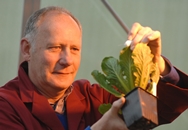 Professor John Walsh talks about his research into how viruses interact with agricultural crop plants, and how to improve vegetable crops’ resistance to viruses without using pesticides.
Professor John Walsh talks about his research into how viruses interact with agricultural crop plants, and how to improve vegetable crops’ resistance to viruses without using pesticides.
His food and agricultural research has helped to improve natural resistance to the viruses that infect plants, reduce the use of pesticides and improve health and welfare.
Scientists reveal why sprouts taste better as you get older… and why your grandparents were right all along
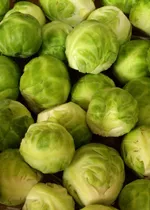 Researchers from Warwick Crop Centre are sharing food for thought about the humble sprout this Christmas and tell us:
Researchers from Warwick Crop Centre are sharing food for thought about the humble sprout this Christmas and tell us:
• Why having a gene mutation makes sprouts taste horrid
• Why sprouts taste better after frost
• Why they make us gassy
Press release (15 December 2022)
Four new academic positions available in the School of Life Sciences
We wish to appoint four excellent and ambitious early to mid-career principal investigators who are capable of developing innovative and original research programmes:
- 2 x Permanent positions focused on Host-virus Interactions
- 1 x Permanent position focused on Plant Virology
- 1 x Permanent position focused on Host Responses to Microbes
£1.7m containment facility will help tackle globally important diseases and prepare for future pandemics
A £1.7m laboratory building which will investigate infectious diseases has opened at the University of Warwick – helping to tackle some of the most globally important human diseases and prepare for pandemics of the future. The new containment suite will enable scientists to conduct cutting-edge research into infectious diseases, including tuberculosis (TB), influenza and COVID-19.
Press release (8 December)
